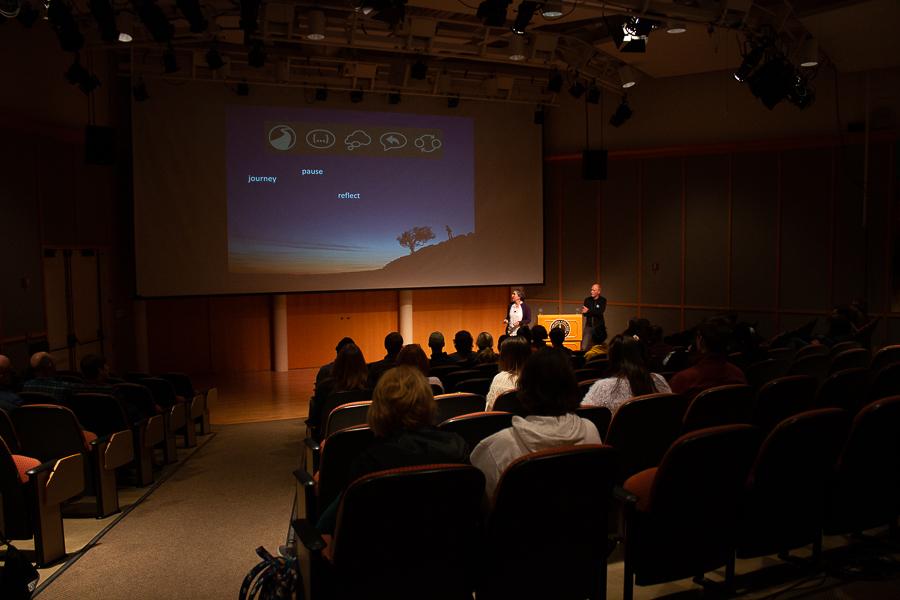Originally published in the Fall 2020 print issue.
By Ure Okike
Student engagement at the collegiate level is a multifaceted subject often looked at through the lens of academics and student life. Colleges and educators strive to actively engage students on their campuses through events such as sports, events, speakers, conferences, clubs and more. Principia’s culture and small size gives it the advantage of ensuring most students can actively engage in any activity that interests them. The pandemic, however, seems to have thrown a wrench in the system.
In adherence to strict COVID-19 regulations, many things have changed at Principia: On-campus facilities have been limited in their use, gatherings are kept small, classes are mostly taken via Zoom. The St. Louis Intercollegiate Athletic Conference (SLIAC) has officially postponed all athletic competitions until no sooner than 2021.
With one-third of the student body currently learning remotely, it is difficult to measure how engaging the learning material is. Senior Abigail DeWeese, the current academic representative on student senate, notes the difficulty in engaging with students that are currently off campus and getting feedback from them.
“My job depends on student engagement, making these reports very much depends on [students engaging],” she says. “I can’t help improve your academic experience or tell people who are in charge how to help unless you tell me.”
This speaks to the eroding lines of communication between students and educators at Principia during the pandemic. One remote student, who chose to remain anonymous, expressed a reduced interest in virtual interaction with professors and fellow students alike.
“Zoom exhaustion is a real thing,” DeWeese noted.
Social interactions amongst students have changed as well. Small things like how students meet to have meals together, where students can visit each other, and how those exchanges are taking place affect how connected students feel to the community. For most of the semester, students could only have meals together outside while following social distancing rules. They could only meet in the recreation rooms of their respective houses while following social distancing rules and wearing a mask. These rules, while necessary, broke down the strength of social engagement amongst students.
Events on campus have seen a huge change also. With the first few weeks of the semester being in Red and Orange phases, two events that usually start off the year – Brooks’ Beach Bash and bowling in Alton – had to be scrapped. The Student Events Office has had to recalibrate how to keep students socially engaged despite the current limitations.
“[There is a] tremendous amount of regulation due to COVID that we need to follow,” says Student Event Manager Heather Holmes. “We have to be careful and thoughtful about the kind of event we have.”
Academic engagement, social interaction, and community participation are vital parts of student life on campus. When the ways students normally engage with the community are put on hold, how do students find ways to actively participate in a meaningful manner?
With restrictions on how and students can gather, student events are taking a different shape, thus impacting student participation in social events. Holmes thinks that the community is doing a great job at adapting to the current situation, specifically noting everyone’s effort to be socially engaged in this period. The few events that have made it in semester’s calendar have had good turnout.
“One hundred and forty [people] tuned in live for the streaming of Starbrookes,” Holmes says, “though we can’t tell if they are all enrolled students.”
The Student Event Office tracks student attendance in social events and noted that there is a comparative uptick in student turnout at house-run events. Joe McNabb’s trivia night was held socially distanced at the Jam factory and had an 11% audience engagement, a significant increase from last year’s 4%, despite COVID restrictions.
Holmes and the social assistants have had to meticulously adjust every event to adhere to the COVID guidelines. Food at events are prepackaged and handed out individually, and events are held outside or in larger spaces with masks. On weekends early in the semester, the social assistants packed ice-creams, cupcakes, or any other individual snacks into a cart attached to a truck and drove around spreading cheer on campus. It is a lot of work, and though understaffed due to some social assistants choosing to attend Principia remotely this semester, Principia’s student events office is pushing to keep students engaged and entertained.
But it is ultimately up to the students to engage with the community. “It’s up to you, the student, if you are going to attend [events] or not [and] have fun or not,” says Holmes.
Principia is also making it a priority to better engage students academically.
“It is goal No. 3 of the strategic plan which will be rolled out soon,” says Roz Hibbs, Principia’s institutional research officer.
Principia has the goal of seeing its students become active participants of whatever community they find themselves in. The College President’s Office issued an extensive survey earlier in the semester, involving student feedback in the decision making for planning the spring semester.
“Student engagement in surveys like that help a great deal,” says Hibbs.
Featured image: Students gather for a presentation in Wanamaker Hall in fall of 2019, well before the pandemic.


